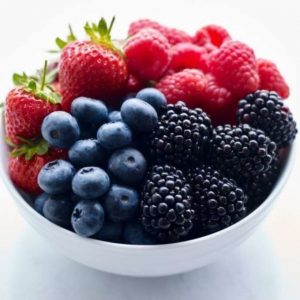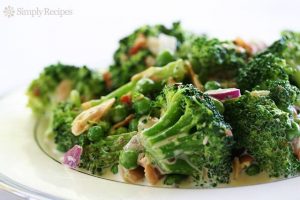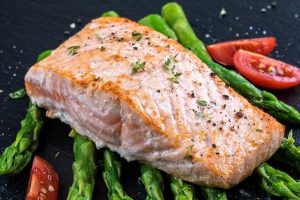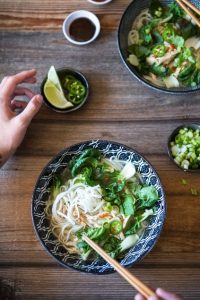After a long summer it seems the Australian winter is finally upon us; the time of year when cold and flu symptoms are on the rise. It seems as though everyone around you will have advice for how to beat your cold or flu, from drinking honey, ginger and lemon teas, or jumping into a sauna to relieve congestion. It can be hard to separate fact from fiction when it comes to the abundance of remedies, so our dietitian has some simple and reasonable advice for you to follow this winter.
Food can play a really important role in preventing and reducing the severity of colds and flu, which is no surprise because 80% of the immune system is located in the digestive tract. Healthy gut bacteria, proteins and other chemicals are just some of the warriors in the digestive system that help to fight off infections. Before illness comes on, it is important to eat a healthy diet to provide the immune system with these nutrients it needs to fight off infections. Here are just some of the foods that help to protect your immune system and should be included in the everyday diet:
BERRIES
Berries are a great source of Vitamin C which is an antioxidant that has antimicrobial properties, protects immune cells from damage and contributes to maintaining a healthy immune system. Vitamin C can also help to reduce duration and severity of colds. Frozen berries have the same nutrition value as fresh berries, so it doesn’t matter if you buy frozen.
CAPSICUM
Capsicum contains twice the amount of Vitamin C as citrus fruits. Vitamin C boosts white blood cells to help fight infections. Include capsicum in stir fries or salads.
BROCCOLI
Broccoli contains Vitamins A, C and E which are antioxidants. Antioxidants assist in preventing cell damage and reduce risk of certain illnesses. Broccoli is best when cooked for the shortest time possible, to keep in the good nutrients
ONION, GARLIC AND GINGER
These all have anti-microbial properties, helping to prevent illness. Use these together when cooking stir fries and pasta dishes.
YOGHURT
Yoghurt is a good source of probiotics to keep your gut healthy and boost immune function. Choose the unflavoured varieties for benefits e.g. plain Greek yoghurts or plain Chobani/Yo-Pro yoghurts
SALMON
Salmon is high in Omega-3 (essential fatty acids) which will help to maintain healthy cells and assists with reducing inflammation, particularly important for recovery for those with heavy training loads.
BRAZIL NUTS
Brazil nuts are high in a nutrient called selenium that helps to protect the body’s cells from oxidative damage. Deficiencies of selenium have been associated with increased risk of illnesses. Incorporate brazil nuts into your diet a few times a week to reap the benefits.
But what happens when you do get a cold or a flu?
Being sick will often result in a decrease in appetite, so every meal consumed while sick is an opportunity to choose nutrient rich foods that will help to fight off infection and speed up recovery. Some foods that should be included in the diet during a bout of cold or flu includes:
Citrus fruits, tomatoes, pumpkin, capsicum and sweet potatoes
What do citrus fruits, tomatoes, pumpkin, capsicum and sweet potatoes have in common? These foods are all high in Vitamin C, which is an antioxidant that has been found to assist with reducing the severity and longevity of colds by protecting cells from damage. Try a roast vegetable tray with tomato, pumpkin, capsicum and sweet potato, or snack on some oranges or mandarins.
Garlic
Garlic has antimicrobial properties so acts as an antibiotic that can help to reduce the severity of your cold.
Vietnamese Pho
Chicken soup has long been a favourite of Mum’s everywhere to help fight off a cold, but Vietnamese Pho is another great option! This big bowl of warming soup will help to rehydrate you by providing plenty of fluid and electrolytes and provides a source of protein. You can even order extra meat to boost the protein content!
Supplements that reduce the severity and duration of colds can be really useful, particularly when you don’t feel like eating a lot! The following are good quality supplements that I recommend you to use while sick:
- Luckily, we can get a lot of vitamin C from food, so it isn’t always necessary to have Vitamin C supplements daily, but they can be helpful once you do get sick. Vitamin C supplements come in many forms so choose one that is of good quality and is non-acidic (so you don’t feel sick/get reflux when using).
- Probiotics help restore gut bacteria after illness, supporting a healthy immune system. Look for a good quality probiotic with 40-50 billion CFU’s (listed on the product).
- Zinc has an antiviral effect in the body and is usually obtained in the diet from poultry and red meats. If you find you are eating less than normal while sick, a zinc supplement can come in handy to assist with reducing the longevity of your cold.
Lastly, the most important thing you can do for yourself is to eat a healthy and varied diet to protect your immune system. Make sure you rest and eat well when sick, using supplements if needed to help reduce the longevity and severity of colds and flu. Book in an appointment with our dietitian to find out more about how a healthy diet can positively affect your wellbeing.





 This article was written by Kelsey Hutton, our Accredited Practising Dietitian.
This article was written by Kelsey Hutton, our Accredited Practising Dietitian.
